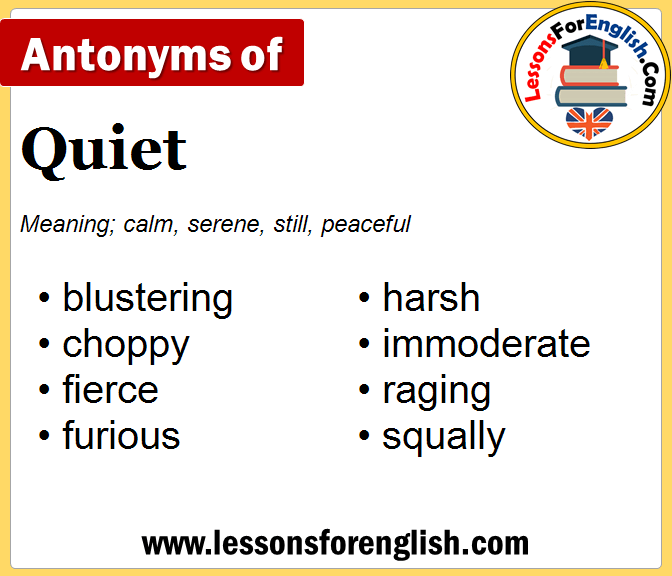

Immovably, inactively, motionlessly, quietly, still.

The mass noun quiet references the quality or state of something with little to no noise, movement, color, chaos, or disturbance. The word quiet appears in English as an adjective, adverb, noun, or verb to reference a quality of calm, silence, or moderation. Especially, exceedingly, extremely, half, halfway, highly, incompletely, part, particularly, partially, partly, surpassingly, very.Īccording to The Oxford English Dictionary, Middle English quite stems from the archaic or “obsolete” adjective quite (a variant of the verb quit).

#Quiet meaning movie#
“I’m not quite finished with the movie yet.”.“Marina has been writing for The Wall Street Journal for quite some time now.”Īdditional phrases of quite include “ not quite” (meaning “not completely or entirely”) or “ not quite the thing,” which references something that is socially unacceptable, unhealthy, or unwell.“Yes, she is quite a writer in every sense of the word.”.The adverb can also describe something as “to a considerable” or “fairly significant extent,” enabling us to use phrases like “ quite some” and “ quite a” to reference a notable amount or something we consider remarkable. “I’m quite tired of listening to your negative commentary.”.“Well, I’m quite prepared to demolish this meal.”Īmerican English, in particular, uses “ quite” as an intensifier to mean “very” or “really.” For example,.“If you’re ready for dinner, the table is quite full.”.In contrast, the adverb quite references a quality of something that exists or performs “to a particular extent or degree.” For instance, we often use quite as a submodifier to mean “ wholly,” “completely,” “to an extreme,” or “to the greatest extent.” For example, if someone told you the weather was nice today, you might agree by responding with “ quite” (similarly to “indeed”). The word quite is an adverb and exclamation, where the latter expresses an agreement or understanding of something stated (especially within British English). The best solution to avoiding the wrong word is to make sure you understand the two words entirely and to proofread your writing (spell checkers are notorious for missing these typos). The verb “quit” is another “ qui-” word that we can easily confuse for “ quite” and “ quiet” (especially if you’re pulling one of those all-nighters). “English grammar is very difficult.” “ Quite.“We are not quite finished with our grammar lesson.”.“I’m quite tired and would like to go to sleep.”.The adverb “ quite” means “to a considerable” or “maximum extent,” but we also use it as an exclamation to express agreement (like “indeed”). “I need the room to be quiet so that I can write.”.“The interruptions are ruining my peace and quiet.The word “ quiet” is a noun, adjective, or verb that references the quality or state of silence, calm, little activity, or moderation. One of the most common errors we make as writers involves “ quiet” and “ quite.” We spell these words nearly the same, yet they have completely different meanings, pronunciations, and we use them for entirely different contexts.

What is the difference between quite and quiet?


 0 kommentar(er)
0 kommentar(er)
